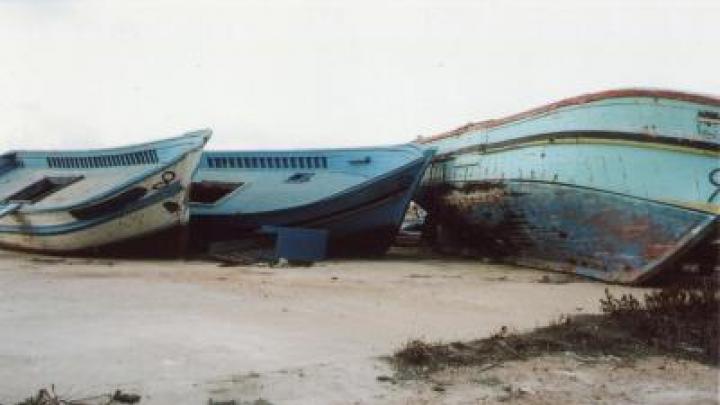Borders Through Time: Commemorating Lampedusa
Posted
Time to read
Post by Victoria Canning and Francesca Esposito. This is the first post of Border Criminologies themed week on 'Borders Through Time: Commemorating Lampedusa' organised by Vicky and Frrancesca.

The 3rd October 2013 is a date that will sadly remain in history to document the geographies of violence drawn by the EU border apparatus. On this day, seven years ago, approximately 368 people died when the boat carrying them from Misrata, Libya, caught fire and sank off the coast of Lampedusa, Italy.
The initial response was one of compassion, sadness, horror and commemoration. We all remember with dismay the images of the coffins inside a warehouse space in Lampedusa, and the declarations of EU and international leaders calling to action to prevent future deaths at sea. Indeed, a few days later, the Italian government launched a rescue operation – Mare Nostrum – in a bid to intervene in further disasters, and thus avoid the loss of further lives.
However, although this tragic event represents the biggest death rate in the Mediterranean and one of the most significant instances of border deaths globally – it was not the first case of mass deaths for migrants crossing the sea, and it has been far from the last, as activists’ reports show. In 2020 alone, there have been more than 1800 deaths at global borders, more than 600 of which registered as in the Mediterranean. However, despite knowing the well evidenced risks that push people to mobilise across dangerous routes, safe passage has been decreased, and rescue missions (including Mare Nostrum) all but stopped.
In the place of state supported humanitarianism, we have seen the further militarisation of global borders, some of which are exacerbated by responses to the ongoing Covid-19 pandemic. But these are themselves not new, and instead should be seen as part of a continuously restrictive continuum which sets to separate those who can travel legally and those who are forced to move across borders clandestinely and risking their life. Where rescue missions were once commonplace, navy interceptions are now prioritised. States regularly grapple with placing responsibility for boats in distress on other states, as we have seen recently in the case of Malta and Italy. The result is the prioritisation of responsibility for people’s lives over the actual lives of people, as it is also expressed by the recent EU Pact on Migration and Asylum whose overbearing focus is on preventing migrants’ access to Europe.
In this week long Border Criminologies series, Victoria Canning and Francesca Esposito highlight the ongoing implications of deaths at global borders. Commemorating the avoidable disaster which unfolded close to Lampedusa, and for this reason focussing primarily on the Central Mediterranean route, we speak with people who have been at the forefront of both crossing borders and of supporting and responding to border crossers. In doing so, we emphasise (as others have done) that border deaths are not generally accidental, but instead the outcome of increasingly violent policies, legislations and political approaches. Over the next seven days, we learn from people who have worked on sea rescue missions, border camps, migrant solidarity groups, as well as in evidencing the numbers of deaths at global borders, and the wider harms these cause at individual, family and community levels. We do this as part of a commitment towards critically acknowledging and questioning the violence of borders, while at the same time placing at the centre of this debate the voices, lived experiences, and resistances of protagonists on the ground.
Any comments about this post? Get in touch with us! Send us an email, or post a comment here or on Facebook. You can also tweet us.
__________
How to cite this blog post (Harvard style)
Canning, V. and Esposito, F. (2020). Borders Through Time: Commemorating Lampedusa
Share
YOU MAY ALSO BE INTERESTED IN
With the support of












